The impact of watching fights on one’s fighting abilities has been a topic of interest for many martial arts enthusiasts, athletes, and coaches. While observing fights can provide some benefits, it is essential to consider multiple factors to understand the overall effect on an individual’s fighting skills.
So, does watching fights make you a better fighter? While watching fights can sometimes be beneficial, it alone doesn’t make you a better fighter. The lessons learned from fights can help your training, but more is needed. You need regular practice, physical conditioning, skill development, and sparring experience to improve your fighting abilities.
Yet there is much to be learned from watching fights. But what exactly do you need to be paying attention to? What should you try and learn from watching pro fighters fight?
Can You Learn to Fight by Watching Fights?
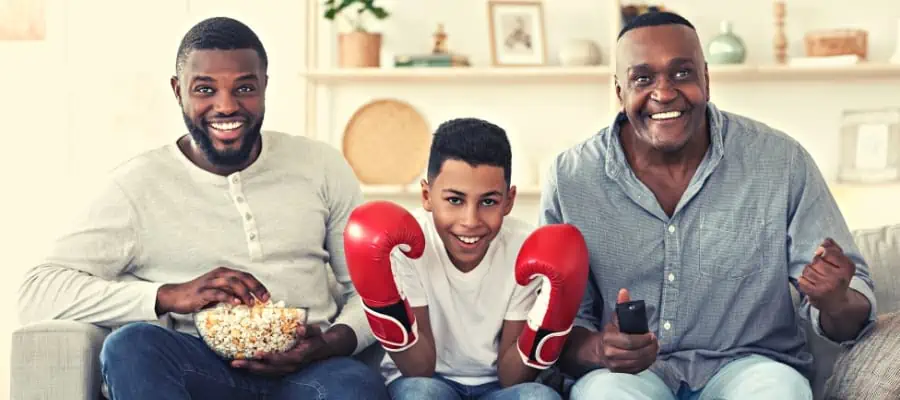
Watching fights can help you understand techniques, strategies, and fighting styles better. Analyzing the movements of skilled fighters can give you insights into effective tactics and movement patterns that you can use in your own training. By studying various fighting styles, you can adapt your own style to counter your opponents effectively and gain a competitive edge.
Additionally, observing fights can enhance your tactical understanding. This allows you to anticipate your opponent’s actions, regulate the distance between you and your opponent, manage the speed of the match, and react appropriately during a fight or sparring match. However, this will only work if you practice what you saw.
Complementing this observational learning with regular practice, physical conditioning, skill development, and sparring experience is essential. Working with a good coach or instructor who can guide one’s training, correct one’s mistakes, and provide constructive feedback is also crucial in reaching one’s full potential as a fighter.
You also need to develop mental strength and discipline through techniques like visualization, meditation, and goal-setting. Learning from experienced fighters, coaches, and sports psychologists can also help. Although watching fights can be helpful, it’s important to combine it with regular training, coaching, and mental preparation if you want to improve as a fighter.
Learning From Observation and Analysis
Watching skilled fighters in action can provide useful knowledge about techniques, strategies, and movement patterns. For example, you could learn a lot by watching Israel Adesanya or Volkanovski throw faints; they are masters at that. You can analyze their performance and adopt new techniques in your training.
By examining successful patterns and tactics of different fighters, you can apply them to your own practice. Watching a defensive boxer like Floyd Mayweather Jr. can help you understand the significance of footwork, head movement, and body positioning. While copying that style might be very hard, it could still provide you with some upgraded defense.
To gain a better understanding of effective fighting strategies, it is important to study how successful fighters approach and plan their fights. This includes analyzing their attack setup, counterattacks, and exploiting weaknesses in their opponent’s defenses.
By learning from these examples, you can better understand the key components that contribute to a successful fighting strategy. I’d recommend picking a fighter whose fighting style you like, analyzing all of their fights in slow motion, and writing down what they did well and could have done better.
Additionally, it’s beneficial to watch fights from various disciplines and levels of competition as it offers a broad range of examples to learn from. By observing professional fights, you can witness the highest level of skill and strategy.
On the other hand, watching amateur or regional-level competitions gives you insight into the mistakes made by less experienced fighters and how their opponents take advantage of those errors. This diverse exposure aids in developing a comprehensive comprehension of the sport and assists in recognizing common errors to avoid during your training and competition.
Can You Learn Different Fighting Styles?
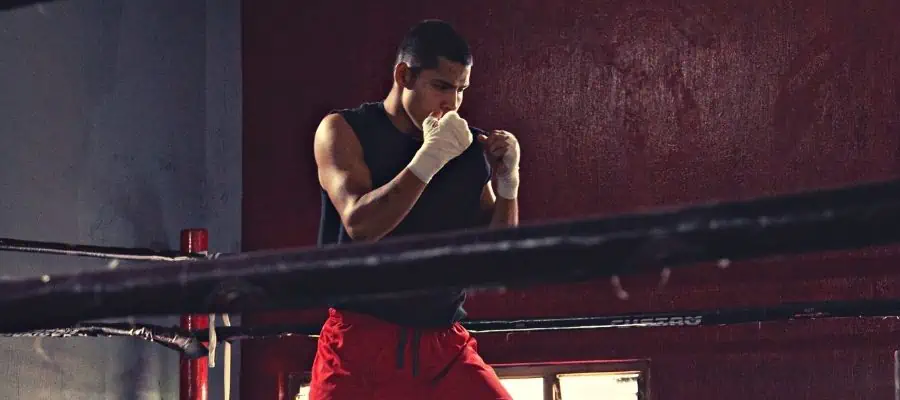
Different fighters employ various fighting styles, each with its own strengths and weaknesses. By watching fights, you can learn about these styles and better comprehend the nuances of each. This knowledge can help you adapt your own fighting style to effectively counter your opponents, giving you a competitive edge.
For instance, watching a Muay Thai fight can expose you to the powerful strikes and clinch work that characterize the art, while observing Brazilian Jiu-Jitsu practitioners can help you appreciate the intricacies of grappling and submissions.
Understanding different fighting styles also allows you to identify the strengths and weaknesses of each style, enabling you to exploit those weaknesses when facing opponents with different backgrounds. For example, wrestlers may only work against a skilled striker if they can take the fight to the ground.
At the same time, a boxer may be disadvantaged against a proficient grappler if they lack takedown defense. By recognizing these stylistic mismatches, you can tailor your own approach to maximize your chances of success in a fight.
To become a better fighter, you should learn different fighting styles. In today’s combat sports like MMA, you need to be good in various disciplines like striking, grappling, and wrestling. By watching fights from different martial arts styles, you can pick up new techniques and approaches that you can apply to your own training. Ultimately, this will help you develop a wider range of skills and become a more versatile fighter.
Can You Learn to Strategise by Watching Fights?
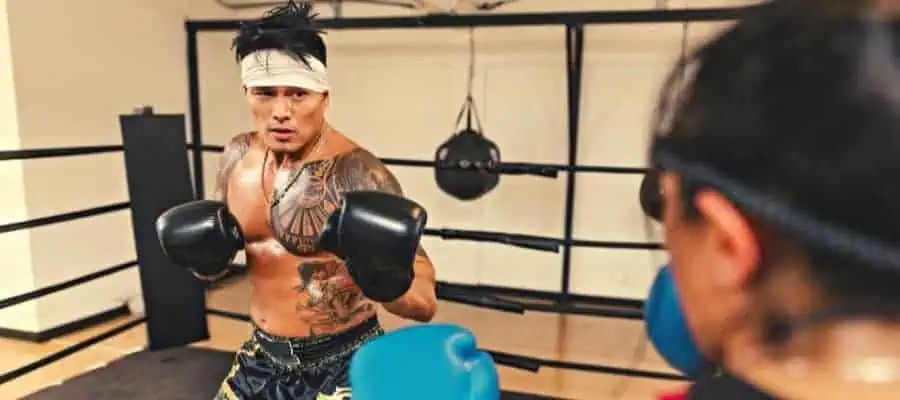
By watching fights, you can enhance your tactical awareness as you observe how fighters create opportunities, regulate distance, and handle the tempo of a fight. You can then apply this new knowledge when fighting or sparring, enabling you to anticipate your opponent’s actions and react appropriately.
For instance, analyzing how Georges St-Pierre goes from striking to grappling (which is masterful) can give you significant knowledge about the significance of timing and utilizing one skill to prepare for another.
If you closely observe how fighters move, you can pick up on cues and patterns that indicate when they are about to attack or defend themselves. This can help you improve your timing and anticipation skills, which are important for both attacking and defending during a fight. For example, by watching Anderson Silva’s feints and misdirection techniques, you can learn how to use deception to create opportunities for your own attacks.
To have good tactical awareness, it is important to know how to react and adjust to your opponent’s moves during a fight. Watching fights can give you examples of how experienced fighters change their tactics depending on their opponent’s strengths and weaknesses. By learning from these examples, you can improve your own adaptability and decision-making skills when under pressure during a fight.
The Importance of Training and Coaching
More than just watching fights is required to enhance your fighting skills. You need to focus on regular practice, physical conditioning, skill development, and sparring experience to improve. It is also important to have a qualified coach or instructor who can guide you, correct your mistakes, and provide constructive feedback to help you reach your full potential. A coach can assist you in refining your techniques and strategies by customizing them based on your unique strengths and weaknesses.
Coaches and instructors also play a critical role in developing a structured training plan that addresses your specific needs and goals. This can include identifying areas for improvement, setting realistic targets, and ensuring that your training regimen is well-rounded and balanced. By working closely with a knowledgeable coach, you can benefit from their experience and expertise, which can significantly accelerate your progress and development as a fighter.
They can also help you navigate the challenges and setbacks that are an inevitable part of any fighter’s journey, such as injuries, plateaus, and competition losses. By offering guidance and encouragement, a coach can play a vital role in fostering your growth and resilience as a fighter.
What You Can’t Develop by Simply Watching Fights
To become a successful fighter, mental preparation, discipline, and the ability to handle pressure are equally essential as physical and technical skills. Just watching fights cannot teach these qualities. Mental training techniques like visualization, meditation, and goal setting play a key role in developing the mental toughness required for combat sports. Seeking guidance from experienced fighters, coaches, and sports psychologists can also help in acquiring the right mindset for competition.
To improve your mental strength, you should build self-confidence and trust in your skills. You can do this by training regularly, setting achievable goals, and reflecting on your progress, and asking your coach for an honest opinion about your progress.
Celebrating your successes and recognizing your growth will help you develop a solid foundation of self-belief, which will be useful when you find yourself in high-pressure scenarios like competitions or important events.
Being disciplined is very important in combat sports. This means you need to follow a regular training routine, maintain a healthy lifestyle, and make sacrifices for your fighting career. If you develop discipline, you can stay focused on your goals even when things get tough.
Overall, mental strength and discipline are crucial qualities that can greatly impact your success as a fighter. If you struggle with self-discipline, I suggest you look at David Goggins and employ some of his tactics.
Are There Any Potential Drawbacks of Watching Fights?
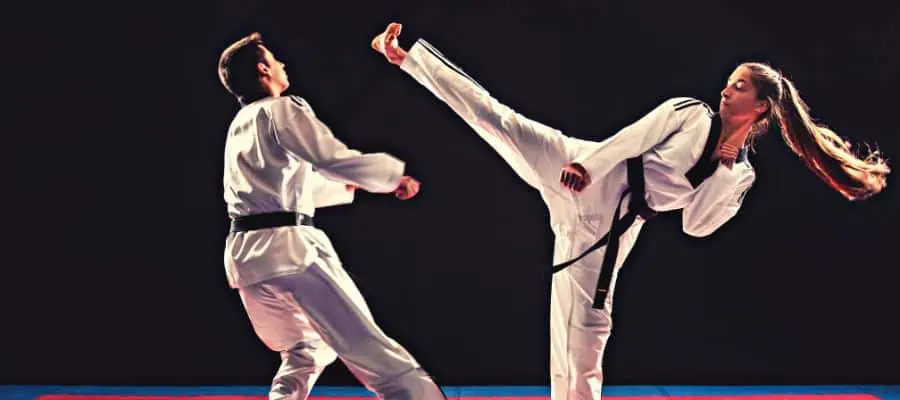
Although watching fights can provide valuable insights for learning, it’s important to be cautious of potential drawbacks. One of these is the risk of adopting bad habits or flawed techniques from low-skilled fighters. To avoid this, it’s crucial to watch and learn from high-level fighters who exhibit proper techniques and strategies instead of imitating habits from inexperienced or badly trained athletes.
One more disadvantage to consider is putting too much emphasis on observational learning. This could result in not giving enough attention to real practice and practical experience. While observing fights can offer useful insights, it cannot substitute the vital physical training and practice needed to acquire mastery of techniques and enhance one’s skills.
It is important to find a balance between watching fights and participating in hands-on training and sparring sessions to guarantee a well-rounded development of skills. Don’t be one of those dudes who think they know how to fight because they watch every UFC event. That’s not how it works.
Relying solely on watching fights can make you passive in your approach to learning. It may hinder the development of your critical thinking and problem-solving skills. To improve as a fighter, it’s important to observe and learn from others and actively analyze, experiment, and adapt your own techniques and strategies based on your strengths and weaknesses. Engaging in self-reflection and seeking feedback from coaches and training partners can be incredibly helpful in promoting this active learning process.
Finally, keep in mind that watching fights may lead to unrealistically high standards or comparisons with elite athletes that can harm your motivation and self-esteem. It’s critical to remember that professional fighters have trained for years and put in a lot of hard work and experience to attain their level of proficiency.
They also can pull off moves and techniques you simply cannot. As a prospective fighter, it is vital to concentrate on your own progress and accomplishments, setting achievable objectives and milestones that are in line with your personal growth and skills.
Conclusion
Watching fights can help you learn about techniques, strategies, and fighting styles, which can improve your tactical awareness and adaptability during fights. But it’s important to remember that watching alone is not enough to make you a better fighter. You must also engage in regular practice, physical conditioning, skill development, sparring experience, and work with a qualified coach or instructor to reach your full potential. Additionally, mental strength, discipline, and the ability to handle pressure are all important aspects of being a successful fighter that cannot be developed solely by watching fights.
If you found this article useful, you may want to save this pin below to your Combat Sports board.
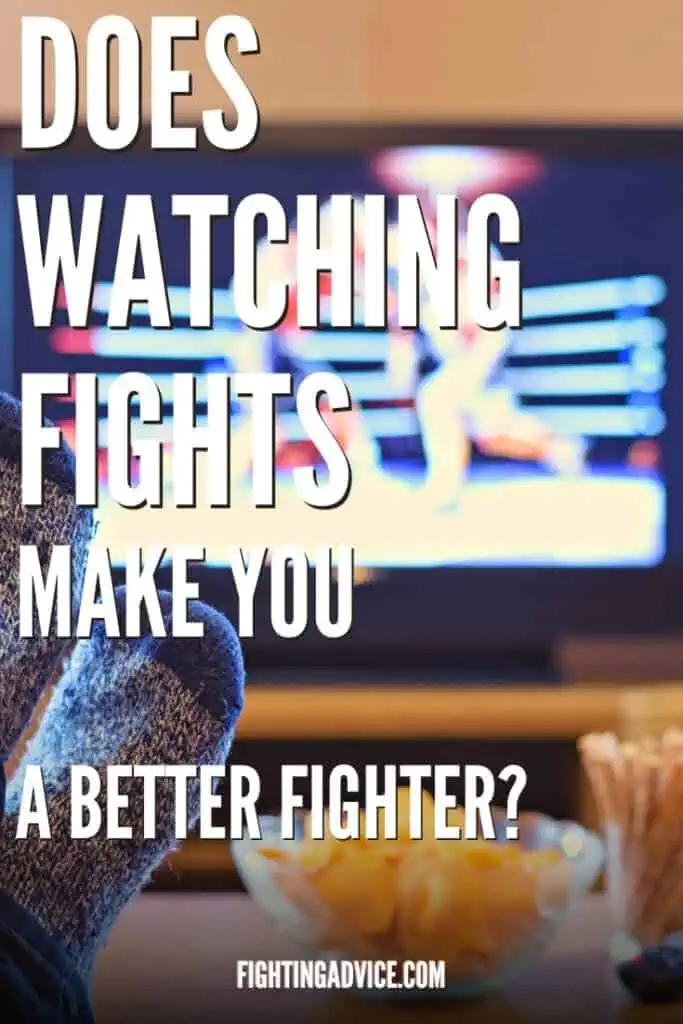
Recent Posts
Can You Do Taekwondo Without Sparring? Exploring Non-Combat Training
Taekwondo, a Korean martial art, is renowned for emphasizing high-flying kicks and powerful strikes. For some, the idea of sparring or engaging in controlled fighting practice with a partner can be...
Can You Combine Muay Thai and Taekwondo? Blending Martial Arts Styles
Combining Muay Thai and Taekwondo may initially seem unusual due to their unique strengths and diverse origins. While Muay Thai, known as "the art of eight limbs," focuses on utilizing fists, elbows,...
